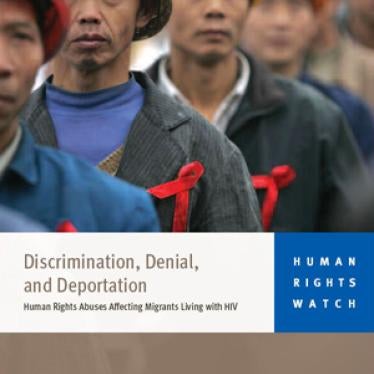President Barack Obama's announcement today that national travel and immigration restrictions on people living with HIV will be removed should have positive consequences for public health and other countries with similar restrictions should follow suit, Human Rights Watch said.
The rule change, to be published in the Federal Register on November 2, 2009, would be followed by a two-month waiting period before going into effect in early 2010.
"Lifting a policy that so clearly violates both human rights and public health needs is long past due," said Joe Amon, director of the Health and Human Rights division at Human Rights Watch. "Countries around the world that still have bans should follow this example."
The US has excluded non-citizens living with HIV from admission to the US, by law or policy, for more than two decades. Current regulations bar non-citizens living with HIV from entering the United States. They also prevent HIV-positive non-citizens from becoming permanent residents, except in limited circumstances. The rule change announced today will lead to the removal of all these restrictions.
National restrictions on entry, stay, and residence for persons living with HIV are discriminatory and violate fundamental rights of people living with HIV. Furthermore, rather than preserving public health and containing the spread of HIV, such restrictions impede effective responses to HIV by fostering misinformation and reinforcing stigma and discrimination.
Obama described the rule change today as effectively "finishing the job" started by the Bush administration when, in 2008, it endorsed the proposal to end the restrictions.
"The change in policy is a positive step," Amon said. "Truly ‘finishing the job,' though, will take a lot more hard work to make sure that all discriminatory practices also end."






